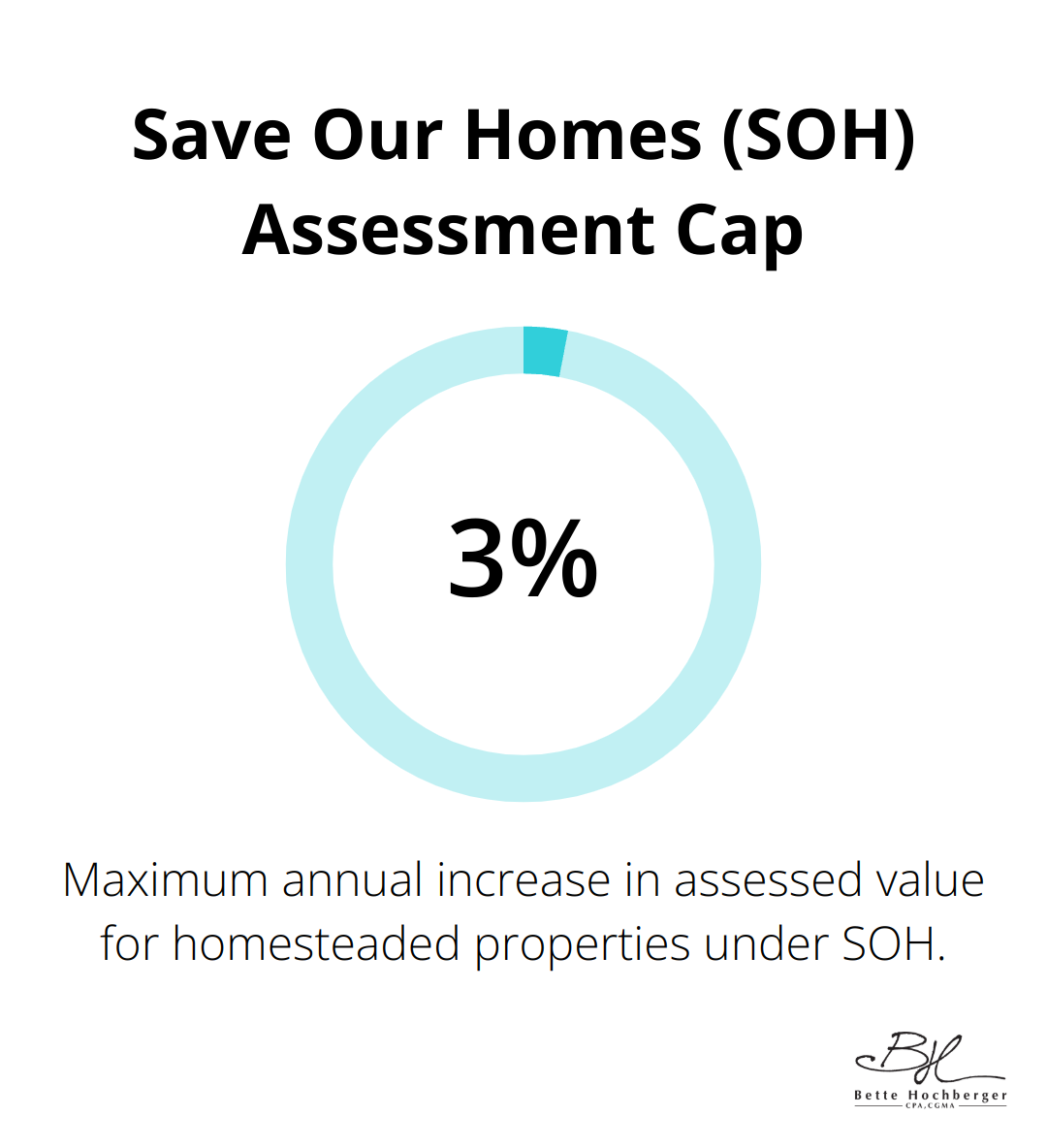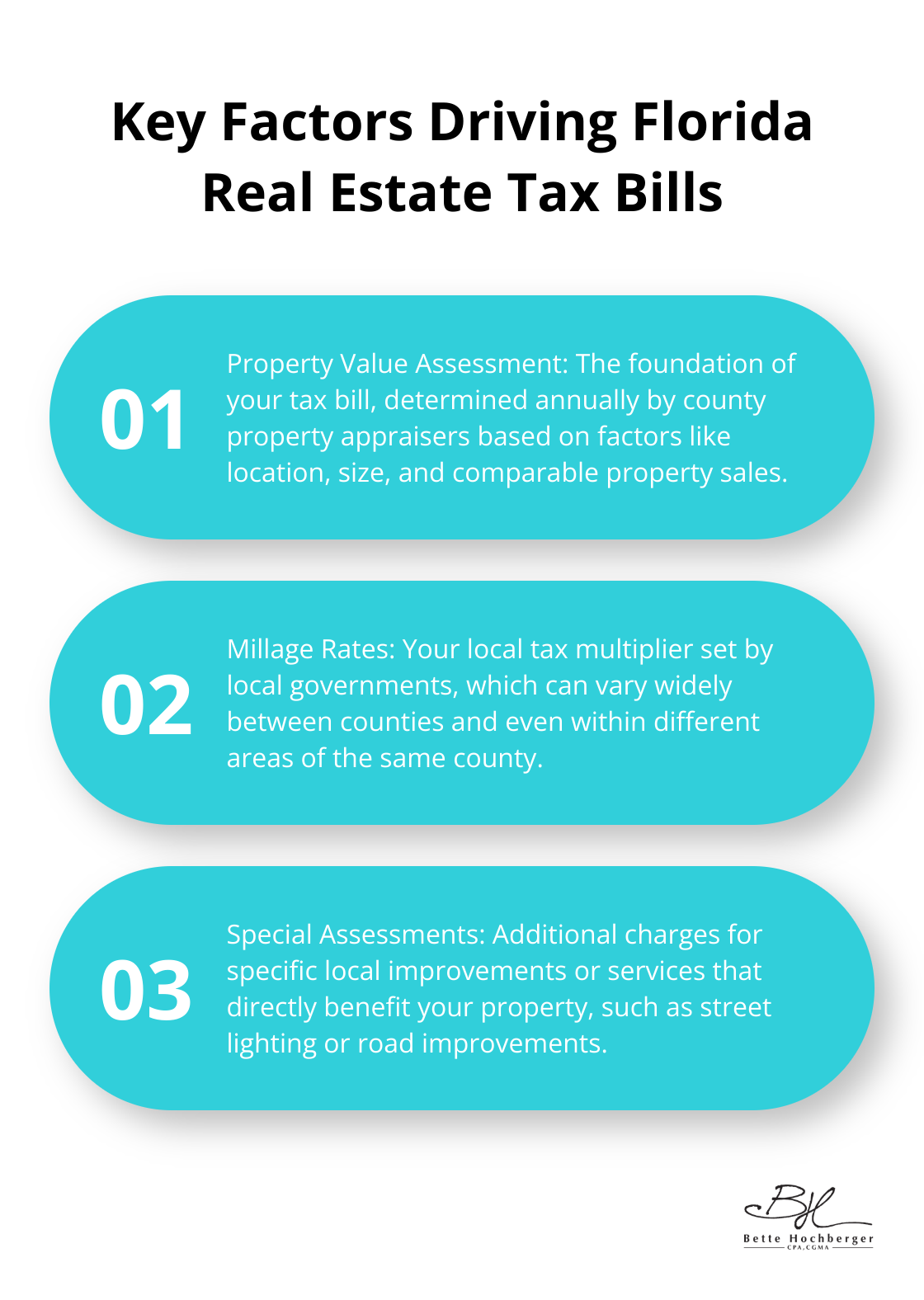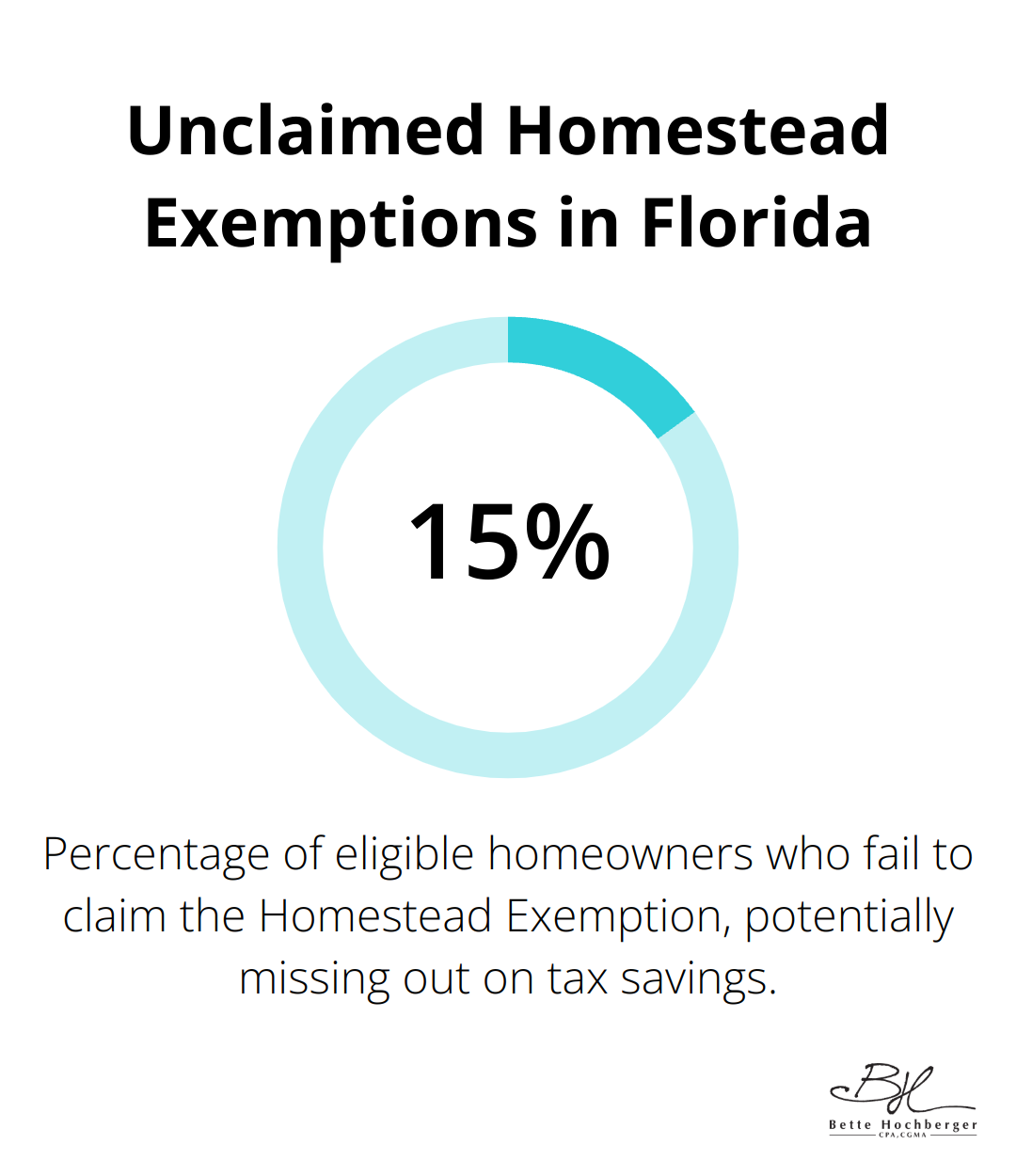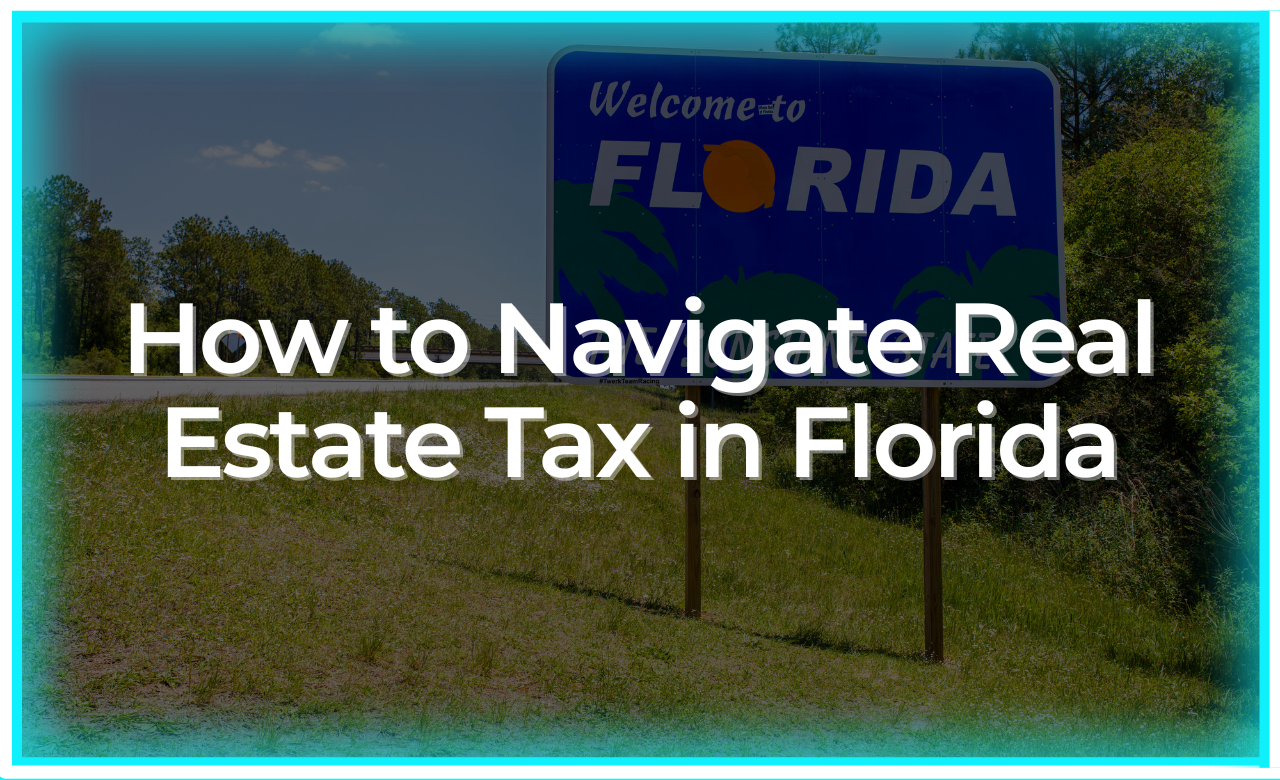Florida’s real estate tax landscape can be complex, but understanding it is essential for property owners and investors. At Bette Hochberger, CPA, CGMA & Associates PLLC, we’ve seen firsthand how proper tax planning can lead to significant savings.
This guide will walk you through the key aspects of real estate tax in Florida, from property assessments to exemptions and strategies for minimizing your tax burden. By the end, you’ll have a clearer picture of how to navigate the Sunshine State’s property tax system effectively.
How Florida’s Real Estate Tax System Works
Florida’s real estate tax system impacts property owners’ finances significantly. The system bases its calculations on the assessed value of properties and local millage rates, which differ by county and municipality.
Property Assessment and Millage Rates
County property appraisers in Florida determine the market value of properties each year. This assessed value forms the basis for property tax calculations. Local governments set millage rates, which represent the tax amount per $1,000 of assessed property value. For instance, a property with an assessed value of $200,000 and a millage rate of 20 mills would incur an annual property tax of $4,000.
The Homestead Exemption Advantage
Florida offers a valuable tool for homeowners: the Homestead Exemption. This exemption can reduce the taxable value of a primary residence by up to $50,000. The first $25,000 applies to all property taxes (including school district taxes), while the additional $25,000 applies to non-school taxes for assessed values between $50,000 and $75,000.
To qualify, you must own and occupy the property as your permanent residence as of January 1 of the tax year. Applying for this exemption is essential and can result in substantial savings. For example, on a $200,000 home with a 20 mill tax rate, the Homestead Exemption could save up to $1,000 annually.
Save Our Homes: Assessment Increase Caps
The Save Our Homes (SOH) amendment is another key feature of Florida’s property tax system. This provision limits the annual increase in assessed value of homesteaded properties to 3% or the percentage change in the Consumer Price Index (CPI), whichever is lower.

This cap can lead to significant long-term savings, especially in areas with rapidly appreciating property values. For instance, if a home’s market value increases by 10% in a year, the assessed value for tax purposes would only increase by 3% (assuming CPI is higher).
The SOH benefit accumulates over time, potentially creating a substantial difference between market value and assessed value. Property owners can partially transfer this accumulated benefit when moving to a new Florida residence through “portability.”
Understanding these key elements of Florida’s real estate tax system is essential for effective financial planning. The next section will explore the factors that influence your Florida real estate taxes, providing a deeper insight into how your tax bill is calculated and what you can do to manage it effectively.
What Drives Your Florida Real Estate Tax Bill?

Property Value Assessment: The Foundation of Your Tax Bill
Your Florida real estate tax bill starts with the property value assessment. County property appraisers determine this value annually. They consider factors such as location, size, and recent sales of comparable properties. This figure varies significantly across counties and regions.
You should review your property’s assessed value each year. If you think it’s inaccurate, you have the right to appeal. In 2023, about 2% of Florida property owners filed assessment appeals. Approximately 60% of these appeals resulted in some form of adjustment.
Millage Rates: Your Local Tax Multiplier
Local governments set millage rates, which significantly impact your final tax bill. These rates can vary widely between counties and even within different areas of the same county. For example, in Orange County, the final millage rates for 2024 have been determined and are available for review.
Local budget needs, voter-approved initiatives, and economic conditions influence these rates. You can attend local government budget meetings to gain insight into potential rate changes and voice your opinion on proposed increases.
Special Assessments: The Hidden Tax Additions
Special assessments can substantially impact your tax bill, often surprising property owners. These charges cover specific local improvements or services that directly benefit your property. Common examples include street lighting, road improvements, or stormwater management projects.
In 2023, Florida property owners paid an average of $450 in special assessments. This figure varied widely depending on location and specific community needs. Some areas saw assessments as high as $2,000 per property for major infrastructure projects.
To manage these costs, you should stay informed about proposed special assessments in your area. Many local governments provide advance notice and even allow property owners to pay these charges upfront at a discount (potentially saving hundreds of dollars over time).
Understanding these key factors will help you navigate Florida’s real estate tax landscape more effectively. The next section will explore strategies to minimize your Florida real estate tax burden, providing practical tips to potentially reduce your overall tax liability.
How to Lower Your Florida Real Estate Taxes
Maximize Your Exemptions
Florida’s real estate tax system offers several opportunities for property owners to reduce their tax burden. The first step to minimize your Florida real estate taxes is to claim all applicable exemptions. Beyond the standard Homestead Exemption, Florida offers additional tax breaks for specific groups. Seniors aged 65 and older may qualify for an extra $50,000 exemption on their homestead property. Veterans with service-connected disabilities can receive substantial exemptions (potentially up to a full property tax waiver for those with 100% disability).
The Florida Homestead Exemption savings can reduce your assessed value on your home as much as $50,000, saving you approximately $750 annually. However, an estimated 15% of eligible homeowners fail to claim this exemption, leaving money on the table.

To ensure you don’t miss out, review your tax bill carefully and consult with a tax professional. A thorough review often uncovers overlooked opportunities for savings.
Challenge Your Property Assessment
If you believe your property’s assessed value is too high, you have the right to challenge it. The key is to act quickly – most Florida counties require appeals to be filed within 25 days of receiving your Truth in Millage (TRIM) notice.
To build a strong case, gather evidence such as recent sales data for comparable properties in your area, photos documenting issues that might lower your home’s value, and professional appraisals if necessary. Owners of higher-priced properties are generally more successful when they appeal county assessments.
Strategic Timing of Property Transactions
The timing of your property purchase or sale can impact your tax liability. In Florida, property taxes are assessed based on the property’s status as of January 1st each year. Buying a property late in the year means you’ll be responsible for the full year’s taxes, even if you only owned it for a short time.
Conversely, selling early in the year could mean paying taxes for months you no longer own the property. To mitigate this, negotiate with the buyer or seller to prorate the taxes based on the actual period of ownership.
Additionally, if you move within Florida, take advantage of the Save Our Homes portability provision. This allows you to transfer up to $500,000 of your accumulated tax benefit to your new homestead property.
Seek Professional Guidance
Implementing these strategies requires careful planning and attention to detail. While the potential savings are substantial, navigating Florida’s complex real estate tax system can be challenging. Professional guidance can help ensure you maximize your tax-saving opportunities while staying compliant with all regulations.
Final Thoughts
Florida’s real estate tax system requires a thorough understanding to navigate effectively. Property owners can save substantial amounts by staying informed about local tax policies and using available strategies. At our firm, specialize in helping property owners manage their real estate taxes in Florida.
Our team of experts provides personalized guidance on maximizing exemptions, challenging assessments, and implementing tax-saving strategies. We keep up-to-date with the latest tax laws and regulations to ensure our clients benefit from every opportunity to reduce their tax burden. Our firm offers comprehensive services tailored to your unique situation, from strategic tax planning to Fractional CFO services.
Don’t leave money on the table when it comes to your Florida real estate taxes. With the right knowledge and expert support, you can navigate this complex system confidently and efficiently. Take control of your property tax situation today and secure a more financially stable future in the Florida real estate market by contacting us for professional assistance.










